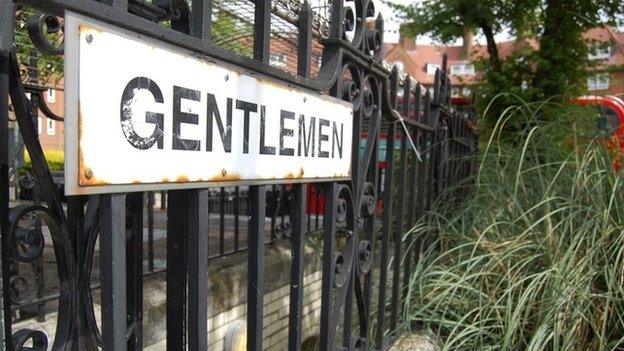Councils call for business rate exemption for toilets
- Published

Ministers are being urged to exempt councils from paying business rates on public toilets, saying it is leading to the closure of facilities.
Parish and town councils say keeping conveniences open is vital for public health and rates are adding thousands of pounds to the cost of running them.
They say laws passed in 2007 require ministers to consider removing barriers to the wellbeing of local areas.
The number of public toilets has fallen markedly in recent years.
The British Toilet Association has estimated that 40% of public conveniences have disappeared in the last decade.
Although councils are not required by law to provide toilets, they have discretionary powers to do so and to charge for their upkeep.
Public toilets have traditionally been liable for business rates in the same way as non-domestic premises such as shops and offices.
'High standards'
Some MPs have long opposed this, arguing that toilets are a public good and cannot be treated as commercial premises for the basis of business rates, which are typically calculated on the rentable value of a property.
They say financial pressures on local government, which has seen big cuts to budgets since 2010, have accentuated the problem.
Cranleigh Parish Council in Surrey failed earlier this year in an attempt to have business rates quashed on their facilities.
The council is paying more than Β£2,200 in rates on toilets this year while Lakes Parish Council, which is also pushing for existing rules to be reviewed, has said rates account for about a sixth of its annual budget.
The National Association of Local Councils, which represents 9,000 town and parish local councils in England, said the government had failed to properly explain its position and is urging ministers to reconsider it.
Business incentives
Under the terms of the 2007 Sustainable Communities Act, it says councils can make representation to central government to "remove legislative or other barriers that prevent them from improving the economic, social and environmental well-being of their area".
"The parish sector feels it is vital to keep public toilets open to maintain high standards of public health and hygiene," said Councillor Derek Liddell, from the National Association.
"They are also important for people with certain medical conditions, for older people, disabled people, pregnant mums and families with kids. So the government needs to act now to help parish and town councils keep these all-important facilities open."
Religious buildings, including churches, and premises used to care for disabled people are among those exempt from business rates under current laws.
A spokeswoman for the Department of Communities and Local Government said: "Local people know what's best for their area, which is why we're asking how we can use business rates to improve the incentive for local authorities to drive local growth as part of our wide ranging review of business rates.
"Our review is considering the impact of reliefs and exemptions and we will certainly take Cranleigh Parish Council's comments in to account."
- Published7 May 2014
- Published14 November 2013